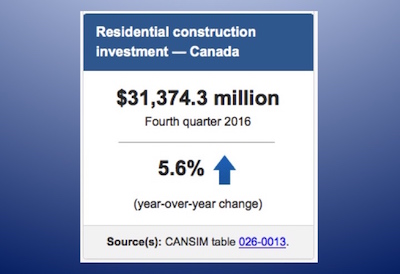YOY Residential Construction Investment Rises 5.6% in Q4 2016

Mar 12, 2017
In the fourth quarter, total investment in residential construction rose 5.6% from the same quarter of 2015 to $31.4 billion, reflecting increased spending on every component except cottages.
Higher investment in single-family dwellings, up 11.5% to $7.3 billion, accounted for nearly half of the increase at the national level. Rising renovation spending (+3.4% to $13.3 billion) and acquisition costs related to new dwellings (+6.9% to $3.6 billion) also contributed to the gain.
Residential construction investment increased year over year in seven provinces in the fourth quarter, led by British Columbia, Ontario and Quebec.
In British Columbia, total spending rose 24.2% from the same quarter a year earlier to $5.7 billion in the fourth quarter, with higher investment in every component except cottages. The gain was led by increased spending in apartments and apartment-condominium buildings, followed by renovations and single-family home construction.
The gain in Ontario (+5.0% to $13.0 billion) was largely the result of increased investment in single-family homes and, to a lesser extent, acquisition costs. The advance was moderated by lower spending on renovations.
The advance in Quebec (+9.3% to $5.5 billion) was led by higher spending on renovations, followed by single-family home construction.
Alberta (-14.2% to $4.0 billion) posted the largest decline, mainly attributable to lower investment in apartment and apartment-condominium buildings, single-family dwellings and, to a lesser extent, acquisition costs and row houses.
Overall for the year, residential construction investment totalled $121.0 billion, up 3.6% over 2015. This marked the seventh consecutive annual increase. Higher investment in apartment and apartment-condominium buildings (+10.4% to $18.4 billion) and single-family dwellings (+6.2% to $27.2 billion) largely contributed to the advance.
In 2016, Ontario registered the highest year-over-year increase (+9.9% to $49.2 billion), followed by British Columbia (+19.6% to $21.0 billion) and Quebec (+3.7% to $22.6 billion). In contrast, the three Prairie provinces saw lower construction spending, with investment in Alberta notably declining by 20.2% to $15.9 billion.
Source: Statistics Canada, www.statcan.gc.ca/daily-quotidien/170302/dq170302c-eng.htm.





![Guide to the Canadian Electrical Code, Part 1[i], 26th Edition– A Road Map: Section 56](https://electricalindustry.ca/wp-content/uploads/2022/11/Guide-CE-Code-2-768x432.png)




![Guide to the Canadian Electrical Code, Part 1[i], 26th Edition– A Road Map: Section 56](https://electricalindustry.ca/wp-content/uploads/2022/11/Guide-CE-Code-2.png)



